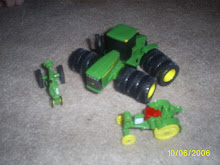This is taken from a workbook on parenting. It's actually a good read and as soon as I find it, I'll post the name.
Responses that reduce anger.
Anger understandably occurs when a person of any age is overpowered. Because young people have so many rules to learn, they are likely to feel overpowered many times a day. (something I had not thought about before) Thinking that children should accept your decisions without comment will only make you frustrated and do little to resolve the situation in a productive way. Understand that refusing to allow children to express any anger at all is just as destuctive as allowing them to vent however they please.
Labeling and feeding back feelings are teh first steps in teaching children how to express diestress without acting out inappropriately. Making at least three statements that rephrase, understand validate or encourage children to express feeings can reduce anger. For example:
- "You don't like it when I correct you. I see you are really angry. You can stomp your foot (scream in this pillow, smash this cane, draw a picture, give me a mean look) to show me how angry you are. I know it's hard to have to learn so many rules.
- I know you don't like being on restriction until your grades improve. It must tear your heart out not to be able to talk to your friends everynight. For a while, you may be very upset with me because I am holding firm.
Postpone talking to children if you are too angry to listen and feedback feeling. Tell them, "I'm too upset for talking right now. We'll discuss this when we've both calmed down." It helps to give both sides to a chance to think so talking can be done clearly.
On a side note I have a 7 and 2 yr old, it's alright to sound like a dork. I would try to word it differently when I was talking to a older child. You need to practice and remind yourself to do it. Don't forget it takes time to get something down and doing it as a response to a child's anger can be especially difficult. breathe. think. react. I don't do or react like this all the time, every time. What I am learning to do is recognize when I react and how I react. It is a process.

I'm sure you are doing a great job disciplining and teaching those boys to deal with their anger... I'll never forget the first time I witnessed you using "the nose on the wall" technique... it was so cruel and heartbreaking.... yea right! Till I found myself using it with my own children and realizing how great it actually worked!! keep up the great advice and stay strong.
ReplyDeleteBrian - what "nose on the wall" technique?
ReplyDeleteDad